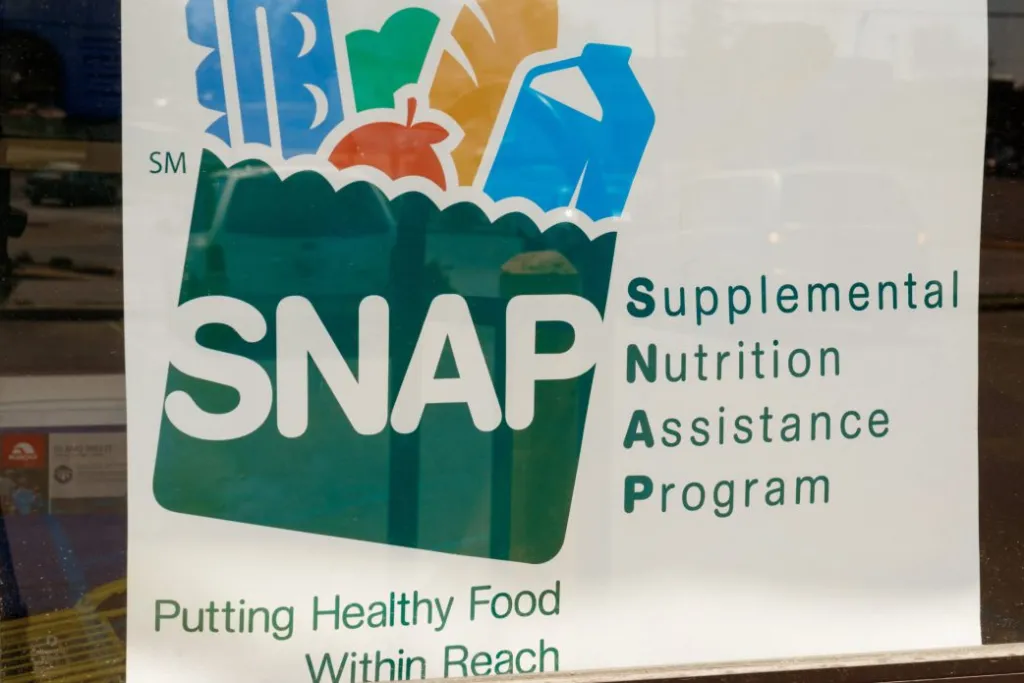NC NEWSLINE – North Carolina Attorney General Jeff Jackson sued the Trump administration Tuesday, seeking to force continued funding for food assistance ahead of an expected pause in benefits Friday.
Jackson, a Democrat, filed suit in Massachusetts alongside a coalition of Democratic-led states against the U.S. Department of Agriculture and the Office of Management and Budget. Their suit argues that the Trump administration should dip into reserve funds to continue funding SNAP benefits, rather than pausing them — which Jackson called “unprecedented.”
“The truth is, the department is choosing not to use the emergency money they’ve been given,” Jackson told reporters Tuesday. “I believe the reason they’re doing that is to play shutdown politics. They are looking to ratchet up the pain in an already painful moment.”
USDA had initially planned to use its $6 billion contingency fund to continue sending out food assistance as the federal government shutdown drags toward one month. But it reversed course last week, informing states that it would not tap into that money.
SNAP helps feed about 1.4 million North Carolinians monthly. The state’s Department of Health and Human Services said Monday that November benefits would not arrive on schedule.
“The USDA must take immediate action to keep families from going hungry as it is required to do by law, and I thank Attorney General Jackson for standing up to secure these critical resources,” Gov. Josh Stein, a Democrat, said in a statement.
USDA did not immediately respond to a request for comment.
Jackson and Democratic states’ suit alleges that the administration is violating federal law by pausing benefits, arguing that “USDA has historically funded SNAP benefits during prior lapses in appropriations.” The lawsuit is asking the court to act as quickly as possible to resume benefits, but it is not yet known if action will be taken before Friday.
Other states have begun moving to continue funding food assistance on their own as the pause approaches. In Louisiana, state leaders are using $150 million monthly to cover benefits. Nevada is funneling $38.8 million toward local food banks.
North Carolina does not appear poised to pursue a similar solution.
State lawmakers were in session as recently as last week, redrawing the state’s congressional voting districts and passing a stopgap spending bill for some state needs. But emergency funding for food aid was not included in that bill or even publicly discussed.
The offices of both General Assembly leaders — House Speaker Destin Hall (R-Caldwell) and Senate leader Phil Berger (R-Rockingham) — did not immediately respond to requests for comment.
In other states, governors have ordered the release of emergency funds. Stein on Monday issued a statement requesting USDA to release contingency funds, but Stein’s office did not immediately respond to a request for comment on whether there were other avenues the state could seek ahead of the Friday pause.
DHHS is not able to cover the gap in funding, said Jonathan Kappler, deputy secretary at the department.
“Unfortunately, the size and scope of this program is one that that avenue was not really available to us,” he told reporters Tuesday.
The looming pause in food aid would have an outsized impact on families — over 580,000 children and 40,000 babies in North Carolina rely on SNAP. Similarly, rural counties would take a hit, with one in six residents in those counties depending on the program, according to Kappler. More than 80% of those on SNAP in North Carolina are currently working, according to state officials.
Food banks and nonprofits can provide some aid, but cannot come close to filling the gap that a pause in SNAP would create. For every nine meals provided through SNAP, food banks provide one, one food bank leader told NC Newsline on Monday.
The CEO of Interfaith Food Shuttle, Ron Pringle, joined Jackson on Tuesday and warned that nonprofits and food banks would be forced to make “tough choices” without the “safety net” of SNAP.
“Nobody wants to make a decision on whose child gets to eat,” Pringle said.
A group of North Carolina food banks called on elected leaders to reach an agreement to end the shutdown in a statement Tuesday. They said they had experienced high levels of need “even before the shutdown.”
“Shutdowns and short-term fixes are not strategy,” said Eric Aft, chair of Feeding the Carolinas and CEO of Second Harvest Food Bank of Northwest NC. “Continuing resolutions are not stability. Nutrition programs must be funded fully and predictably so that families, farmers, schools and health systems are not held hostage to gridlock.”
The federal nutrition program that helps pay for baby formula could also see a future pause.
State health officials said Monday that benefits for more than 262,000 women, infants and children will continue through early November, but did not give an exact end date. Wake County said WIC benefits will continue through Nov. 15.
“We are on guard against that,” Jackson said of a potential stoppage in WIC.
